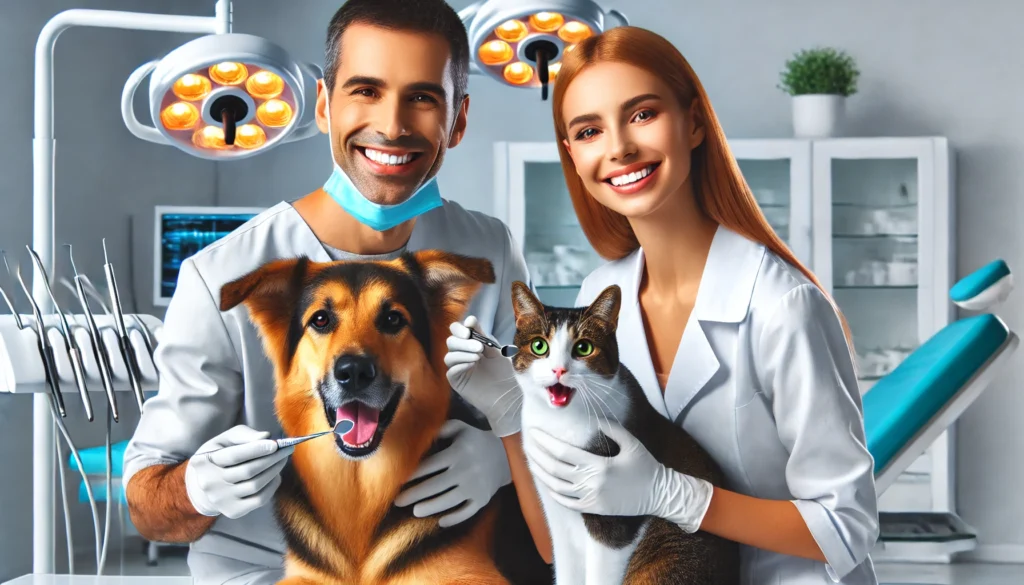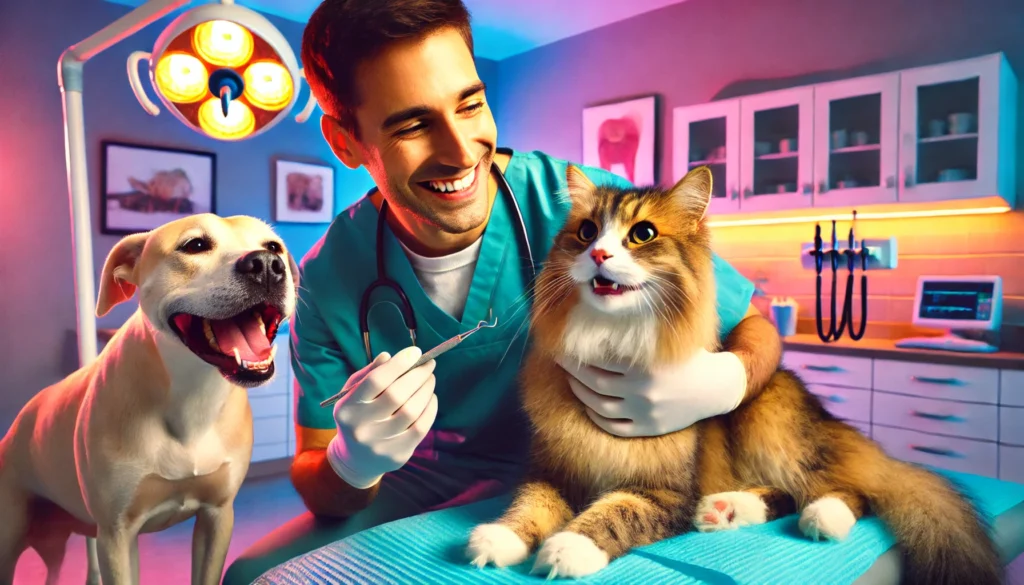Maintaining the oral health of our beloved dogs and cats is one of the most important tasks to ensure their well-being and quality of life. Did you know that more than 80% of pets have some type of dental problem after the age of three?
This can be avoided with regular care and attention to oral hygiene. In this article, I will share with you practical and effective tips for keeping your pets' oral health up to date, so that they can live a long and healthy life, free from pain and discomfort.
Importance of Oral Health in Dogs and Cats
Our pets' oral health goes far beyond fresh breath. Dental problems can lead to serious illnesses, such as bacterial infections that can affect the heart, liver and kidneys.
Additionally, tartar and plaque buildup can cause severe pain and difficulty eating. Therefore, it is essential to pay attention to the oral hygiene of our four-legged friends from an early age.
Symptoms of Oral Problems in Pets
Symptoms of oral problems can vary, but some common signs include:
- Persistent bad breath
- Red or swollen gums
- Gum bleeding
- Difficulty chewing or eating
- Loss of teeth
- Excessive drooling
- Change in behavior due to pain
If you notice any of these signs, it is essential to take your pet to the veterinarian for a detailed evaluation.
Prevention is the Key
Prevention is always the best medicine. Here are some tips for maintaining your pets' oral health:
Regular Teeth Brushing
Regularly brushing your teeth is the most effective way to prevent plaque and tartar buildup. Use a toothbrush and toothpaste specifically for pets, never use human toothpaste.
Start brushing your pet's teeth gradually, so that he gets used to the process. Make brushing a positive moment by offering rewards and praise.
Proper Nutrition
Food plays a crucial role in the oral health of pets. Dry foods, such as kibble, help remove plaque from teeth. There are also specific foods for oral health, which contain ingredients that help reduce tartar buildup.
Dental Snacks
Dental treats are an excellent way to complement pets' oral hygiene. They help clean your teeth while providing a moment of pleasure. However, it is important to choose quality snacks and offer them in moderation.
Chew Toys
Chew toys are great for keeping pets' teeth clean and strong. They encourage chewing, helping to remove plaque and massaging the gums. Choose toys appropriate for your pet's size and age.
Regular Visits to the Veterinarian
Regular visits to the veterinarian are essential to maintain pets' oral health. Your veterinarian can perform professional dental cleanings and detect any problems early. In addition, he can advise on the best care and products for your pet's oral hygiene.
The Importance of Hydration
Keeping your pet hydrated is essential for oral health. Water helps clean your mouth and reduce bacteria buildup. Make sure your pet always has fresh, clean water available.
Oral Hygiene Products for Pets
There are several products available on the market that can help with pets' oral hygiene, such as mouthwashes, dental sprays and water additives. Consult your veterinarian to choose the best products for your pet.
Professional Dental Treatments
Sometimes, even with all the care at home, professional dental treatment may be necessary. Procedures such as removing tartar and extracting compromised teeth are performed by the veterinarian under anesthesia.
It is important to follow your veterinarian's recommendations and perform these procedures when necessary to avoid serious complications.

Technological Support: Applications to Take Care of Pets’ Oral Health
Technology can be a great ally in maintaining pets’ oral health. There are several apps that can help owners keep track of daily care and remember vet visits. Here are some examples:
- Pet Dental Care: This app offers brushing reminders, dental care tips and allows you to track your pet's oral health history.
- Healthy Pet: In addition to taking care of oral health, this app helps manage your pet's general health, including vaccinations and nutrition.
- PetDesk: With this app, you can schedule veterinary appointments, receive medication reminders and monitor your pet's dental care.
Extra Tips for Maintaining Pets’ Oral Health
- Start early: Get your pet used to brushing from a young age so that he gets used to the process.
- Be patient: Adapting to brushing can take time, be patient and consistent.
- Reward your pet: Use rewards to make brushing a positive experience.
- Pay attention to the signs: Observe your pet regularly to detect any signs of oral problems.
Natural Foods and Supplements that Help with Oral Health
In addition to specific foods and dental treats, some natural foods can help maintain pets' oral health. Carrots, for example, are great for cleaning teeth due to their crunchy texture.
Apples, in small pieces and without seeds, can also be beneficial. Always consult your veterinarian before introducing new foods into your pet's diet.
Oral Hygiene and the Quality of Life of Pets
Maintaining good oral hygiene not only prevents diseases, but also contributes significantly to the quality of life of pets. Animals with healthy teeth and gums are more active, have less pain and enjoy their meals more.
Additionally, the lack of oral diseases means fewer visits to the vet for painful and expensive treatments.
The Relationship Between Oral Health and Behavior
Dental problems can negatively influence pets' behavior. Constant pain and discomfort can lead to changes in behavior, such as aggression or apathy.
Taking care of your pet's oral health not only improves their physical well-being, but also their emotional and behavioral state.
Owner Education is Fundamental
Educating the owner about the importance of pets' oral health is essential. Many dental problems can be prevented with knowledge and early action.
Attend lectures, workshops and talk to your veterinarian to stay informed about the best oral hygiene practices for your pet.
The Veterinarian’s Role in Pets’ Oral Health
The veterinarian is your greatest ally in maintaining the oral health of your pets. Regular consultations allow for detailed and professional monitoring.
In addition, the veterinarian can perform procedures that you cannot do at home, such as deeper cleanings and specific treatments.

Conclusion
Maintaining the oral health of dogs and cats is a crucial responsibility to ensure their quality of life and well-being.
With regular care, adequate nutrition and the support of technologies such as apps, it is possible to prevent dental problems and promote a healthier and happier life for our four-legged friends. Don't wait for problems to appear, start taking care of your pet's smile today.
